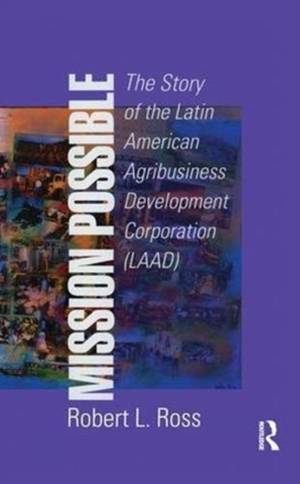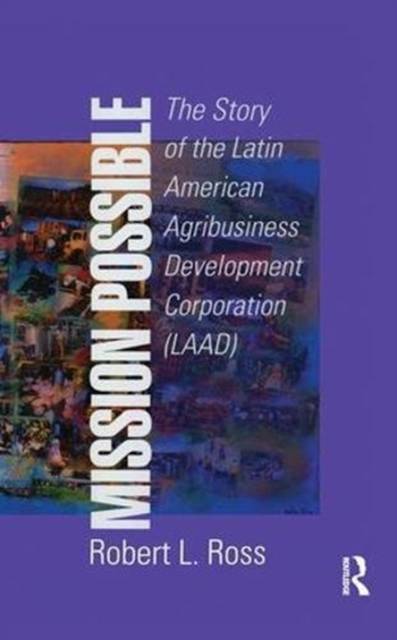
- Afhalen na 1 uur in een winkel met voorraad
- Gratis thuislevering in België vanaf € 30
- Ruim aanbod met 7 miljoen producten
- Afhalen na 1 uur in een winkel met voorraad
- Gratis thuislevering in België vanaf € 30
- Ruim aanbod met 7 miljoen producten
Zoeken
Mission Possible
The Latin American Agribusiness Development Corporation
Robert Ross
Paperback | Engels
€ 62,45
+ 124 punten
Uitvoering
Omschrijving
The Latin American Agribusiness Development Corporation (LAAD) was one of many initiatives taken at the height of the Cold War to alleviate poverty in countries threatened by communist insurgencies. Its mission was to promote rural development by funding local agribusiness enterprises to create new permanent jobs and new economic activity. In Mission Possible, Ross, president of LAAD from 1972 to 1998, gives a richly detailed insider's account of the company's first three decades.Originally capitalized with a little over $2 million, and beginning with the small economies of Central America, it gradually expanded into the Caribbean islands and South America and now is a factor in 25 countries. To date, LAAD has provided over $300 million to 700 projects, generating tens of thousands of new jobs and new annual exports of $500 million. Always profitable, it has paid a dividend for twenty years. Its capitalization has grown to over $30 million by reinvesting most of its earnings in Latin America. Since LAAD was committed exclusively to Latin America, it had to contend with an often unsettled political environment; it could not simply stand on the sidelines and wait for conditions to improve. Indeed in a broader sense LAAD's mission was to help improve those conditions.Mission Possible describes a small but significant chapter in a broader context of how the world's rich countries have tried to raise living standards among their poorer neighbors. Students of economic development and international business management will learn much from the story of how this unique experiment grew into a dynamic enterprise."[Ross] offers innumerable studies [in Mission Possible] of investment projects that stimulated the commercial production of agricultural produce in the region. He recounts the frustrating negotiations with uncomprehending central bankers and the difficulties of developing marketing and other infrastructural networks that are so important for assuring the success of any business, and is pleased with what he identifies as the two most significant changes that profoundly affected agriculture: the decline in the role of the state in Latin America and in protectionism in the industrialized world. ... He stresses the fundamental roles that innovative entrepreneurs can play, taking advantage of opportunities created by organizations like LAAD, and using market information to reduce uncertainty." -David Barkin, Latin American Research ReviewRobert L. Ross, a Harvard-educated development economist, has worked for forty years in Latin America. He taught economics at the Latin American Economic and Social Planning Institute in Santiago, Chile and worked on the first development plans in Haiti and Paraguay. He was president of the Latin American Agribusiness Development Corporation from 1972 until his retirement in 1998.
Specificaties
Betrokkenen
- Auteur(s):
- Uitgeverij:
Inhoud
- Aantal bladzijden:
- 160
- Taal:
- Engels
Eigenschappen
- Productcode (EAN):
- 9781138512269
- Verschijningsdatum:
- 9/02/2018
- Uitvoering:
- Paperback
- Formaat:
- Trade paperback (VS)
- Afmetingen:
- 203 mm x 127 mm
- Gewicht:
- 452 g

Alleen bij Standaard Boekhandel
+ 124 punten op je klantenkaart van Standaard Boekhandel
Beoordelingen
We publiceren alleen reviews die voldoen aan de voorwaarden voor reviews. Bekijk onze voorwaarden voor reviews.











